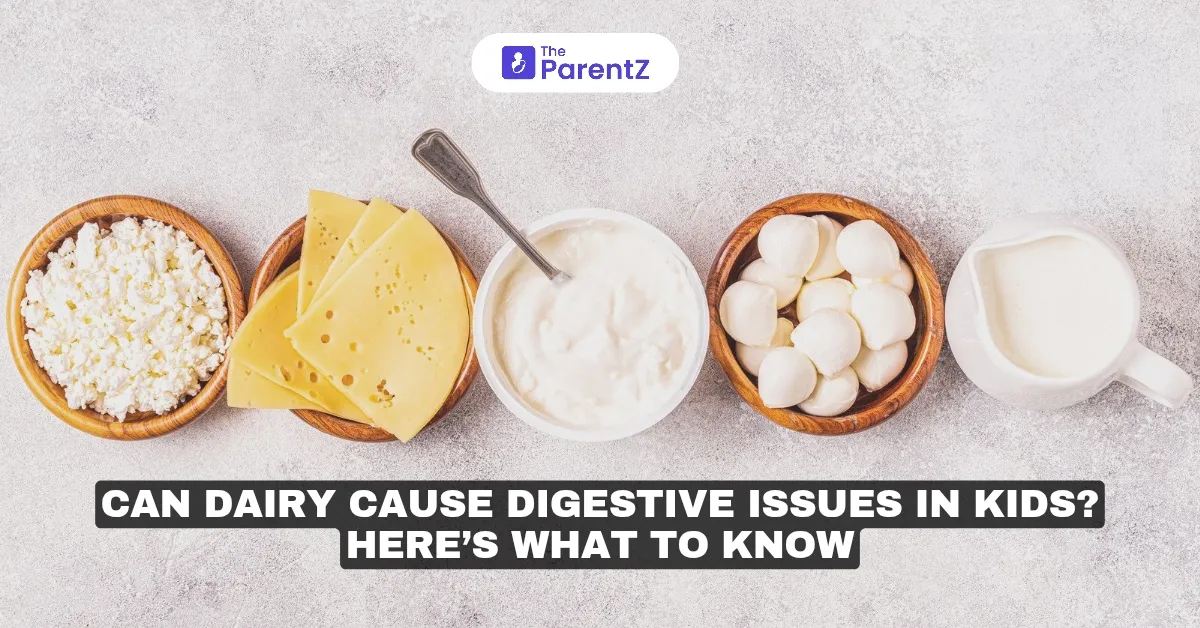A glass of milk, a slice of cheese, a bowl of yogurt — for many families, dairy is a daily staple. But the truth is not every little tummy handles dairy the same way. Yes, dairy can sometimes be a sneaky culprit behind digestive discomfort in kids. Therefore, it is important to understand the difference between normal reactions and red-flag symptoms.
Read this article to explore whether dairy can cause digestive issues in kids and what you need to know.
Understanding Dairy and Digestion
Dairy products, including milk, cheese, yogurt, and butter, contain a natural sugar called lactose. For the body to break down this sugar, it uses an enzyme called lactase — found in the lining of the small intestine.
Some kids don’t produce enough lactase. When this enzyme is missing or in short supply, lactose moves through the gut undigested, causing fermentation by gut bacteria. This process creates gas, bloating, cramps, and, in many cases, diarrhea.
Lactose Intolerance vs. Milk Allergy: What’s the Difference?
Lactose intolerance is a digestive problem, not an immune system issue. It usually develops as children grow, especially in older kids and teens.
A milk allergy, on the other hand, involves the immune system reacting to milk proteins like casein or whey. Symptoms often go beyond stomach trouble — think hives, wheezing, or even anaphylaxis in severe cases. Allergies typically show up early, often before a child’s first birthday, while lactose intolerance tends to appear later.
Common Digestive Symptoms Caused by Dairy
If your child’s tummy often throws a fit after a dairy-filled meal, look for these common signs:
- Bloating and gas: If their belly looks or feels tight and gassy after consuming milk-based foods, dairy might be the culprit.
- Loose stools or diarrhea: Frequent, watery stools, especially soon after eating or drinking dairy, could point to lactose intolerance.
- Abdominal cramps: Sharp stomach pain, often located around the lower belly, is another red flag.
- Nausea: Some kids feel nauseated shortly after consuming milk or dairy-heavy snacks.
How Common is Dairy-Linked Digestive Trouble in Kids?
Surprisingly common. According to studies, lactose intolerance affects about 30 to 50 million people in the United States alone — and while it’s less common in children under age five, it tends to become more noticeable as kids grow older. Globally, some ethnic groups — especially those of Asian, African, and Hispanic descent — have higher rates of lactose intolerance, with as many as 75 to 90 percent affected by adulthood.
Tips for Managing Dairy Sensitivity in Kids
If dairy seems to cause your child trouble, here’s what parents can try:
- Lactose-Free Dairy Options: Many supermarkets offer lactose-free versions of milk, yogurt, and cheese that are easy on sensitive stomachs.
- Smaller Servings: Sometimes, it’s not what but how much. Reducing portion sizes can allow the body to handle small amounts of lactose without discomfort.
- Dairy Alternatives: Almond, soy, oat, and coconut milk are excellent stand-ins, but make sure they’re fortified with calcium and vitamin D.
- Lactase Supplements: These enzyme tablets or drops can help break down lactose and reduce symptoms when dairy can’t be avoided.
If you suspect an allergy rather than intolerance, consult a pediatrician or allergist before making drastic dietary changes.
Conclusion
At the end of the day, dairy isn’t bad — but it’s also not suitable, especially for growing kids with delicate digestive systems. Whether it’s the occasional post-milk tummy ache or ongoing discomfort, listening to your child’s body is always the first step. After all, every child deserves a happy, healthy tummy — dairy or no dairy.








Be the first one to comment on this story.